Low-Carb Diet: Types, Benefits, And Meal Plan
Find out about an exciting diet plan that offers visible weight loss along with numerous health benefits.

Image: Shutterstock
Amidst ever-evolving diet trends, the low-carb diet has emerged as an effective approach for weight management. Although people follow it mainly for weight loss, restricting the amount of carb intake may help reduce cholesterol levels and enhance overall well-being. A low-carb diet majorly focuses on consuming protein, fat, and a wide variety of vegetables, and limits foods rich in carbohydrates. There are a variety of low-carb diets, and each has different guidelines regarding carb restrictions. The article below provides a clear understanding of a low-carb diet, its types, the foods to include and exclude, as well as benefits and possible side effects. Scroll down to learn more about these in detail.
 At A Glance: Low-Carb Diet
At A Glance: Low-Carb Diet- Principle: A diet that restricts carbohydrate intake and emphasizes fat and protein intake.
- Purpose: To make the body use the stored fat, leading to appetite control, weight loss, and blood sugar control.
- Who Is It For: For those seeking weight loss and who want to manage type 2 diabetes and other metabolic syndromes.
- Duration: Short-term
- Who Should Avoid: Individuals with kidney problems or a history of kidney stones, eating disorders, nutritional deficiencies, as well as pregnant and breastfeeding individuals.
- Cons: May increase the risk of nutritional deficiencies and cause headaches, cramps, and constipation.
In This Article
What Is A Low-Carb Diet?
A low-carb diet emphasizes the consumption of proteins and fats, primarily obtained from healthy foods. This dietary approach also limits the consumption of carbohydrates, and hence carbohydrate-rich foods, like pasta, bread, and sugary items are highly restricted in this diet. In terms of regular consumption, you can pick protein sources like lean meat, eggs, and fish, while nuts, seeds, and oils can be retained as a source of healthy fats. When compared to low-fat diets, low-carb diets promote effective weight loss for a short term. In addition, these types of diets help in controlling blood sugar levels. They have also been associated with improved markers of heart health, such as reduced triglyceridesi A type of fat found in the bloodstream that at high levels can increase the risk of heart disease. and increased HDL (good) cholesterol levels (1).
While carbs are highly limited in this diet, the limitations may differ based on health conditions and weight loss goals. In the section below, you will find out what is the permissible range of carbohydrates for this diet.
How Many Carbs Can Be Taken In A Low-Carb Diet?
Although it is highly subjective, for any low-carb diet, the carbohydrate intake typically ranges from about 20 to 130 grams of net carbohydrates per day (2). This changes as per the individual weight loss goals, their underlying health conditions, and age. It is best to consult a nutritionist or dietitian to decide this range without any risk of the potential side effects.
While the principle of this diet is simple to understand, there are various types to explore. The section below lists these in some detail.
Different Types Of Low-Carb Diets
- The Ketogenic Diet: A true ketogenic diet is high in fat, allows moderate to low protein consumption, and very low carbohydrates, at around 20-50 grams a day. Since the body is deprived of carbs, the glucose need is fulfilled by ketone production, through a fat-burning mode called ketosisi A metabolic state in which the body primarily burns stored fat for energy due to reduced carbohydrate intake. , which can lead to fast weight loss. Basically, the liver produces ketone bodiesi Molecules produced during fat breakdown which serve as an energy source to replace glucose energy during low-carb diets. from the fat reserves in the absence of glucose from carbs (3).
- The Atkins Diet: The Atkins diet has four phases that start with strict carb limits which are tweaked to gradually add them back to the diet. It is more like easing into a low-carb lifestyle.
- The Eco-Atkins Diet: This diet is akin to a plant-based Atkins and is perfect for those who prefer low-carb, vegan, or vegetarian eating. In this diet, you get your protein from foods like tofu, tempeh, and legumes.
- The Paleo Diet: This diet puts major emphasis on eating natural, unprocessed foods, like fresh meat, fish, fruits, vegetables, nuts, and seeds. There is an unwavering restriction on grains, dairy, and processed items.
- The Mediterranean Diet: This diet is not super low in carbs, but it is a balanced diet that is good for the heart (4). It particularly encourages the consumption of healthy carbohydrate sources like whole grains, legumes, and vegetables, and sources of healthy fats like olive oil, nuts, and fish.
There is also the high-protein low-carb diet which borrows principles from the Mediterranean and DASH diets, and focuses on reducing carbs while boosting protein intake. In all these diets, carbohydrate limitations remain the same while maintaining a wide variety of food choices. A low-carb diet can help optimize your health in different ways. Let’s take a look.
Benefits Of A Low-Carb Diet
1. Helps Maintain Steady Energy Levels
Anecdotal evidence suggests that when you eat fewer carbs, your blood sugar levels remain stable, preventing energy crashes, and helping you feel more alert during the day. In addition to this, ketones become a highly efficient fuel source for the body and brain. Unlike carbs, which can lead to energy spikes and crashes, ketones provide a steady and consistent source of energy (5).
2. May Improve Blood Sugar Levels
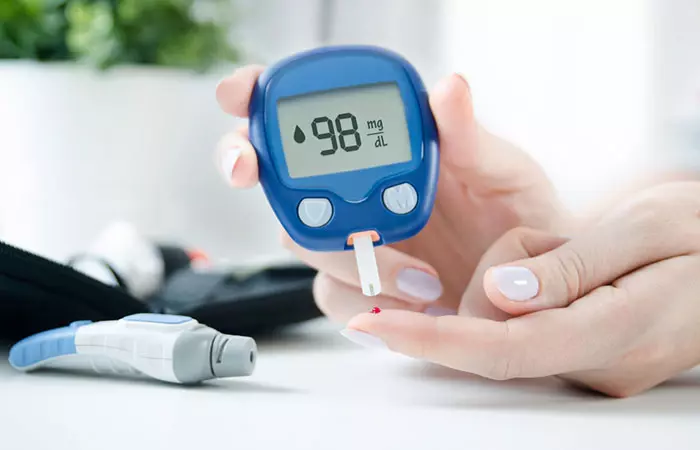
Carbohydrate-balanced diets are like superheroes for those with diabetes because they help keep your blood sugar levels in check, reducing the need for medication. This diet also helps reduce triglycerides and positively affects glycosylated hemoglobin (6). In addition, low-carb diets can induce a state of ketosis, where the body primarily burns fat for energy. This is especially beneficial for those who are overweight. Moreover, ketones are a more stable energy source than glucose, helping to avoid blood sugar spikes and crashes (7). If managing blood sugar levels is a priority for you, then you can pair the low glycemic diet with a low-carb diet, focusing on foods with low GI value to stabilize your blood sugar.
3. May Promote Cardiovascular Health

Low-carb diets lower triglyceride levels and boost HDL (good cholesterol), reducing the risk of heart disease. Moreover, they can effectively reduce serum cholesterol (8). In addition to this, a low-carb diet encourages the consumption of saturated fats like nuts, seeds, and avocados, which reduce the risk of coronary heart disease and also promote cardiovascular health (9).
4. May Improve Appetite Control
Eating a low-carb diet might help you feel less hungry and keep you fuller for long, making it easier to restrict your calorie intake for successful weight management. It was also found that people on low-carb diets experienced reduced appetite and increased feelings of satiety. Feeling satiated may help reduce cravings, promoting mindful eating, which may help with weight management over time. This function may be linked to the process of ketosis, which can help suppress appetite (10). However, further research is warranted in this regard.
5. May Help Reduce Blood Pressure
Research has shown that low-carb diets can be good for controlling blood pressure, as it has a positive impact on systolic blood pressure (11). A low-carb diet may improve both hyperinsulinemia and insulin resistance, thereby promoting the loss of sodium in the urine to reduce blood pressure levels (12).
 Did You Know?
Did You Know?Following a low-carb diet isn’t complicated. While food preferences may vary based on a specific diet plan, here is a guide to what foods you may eat and avoid when on a low-carb diet.
Foods To Eat On A Low-Carb Diet
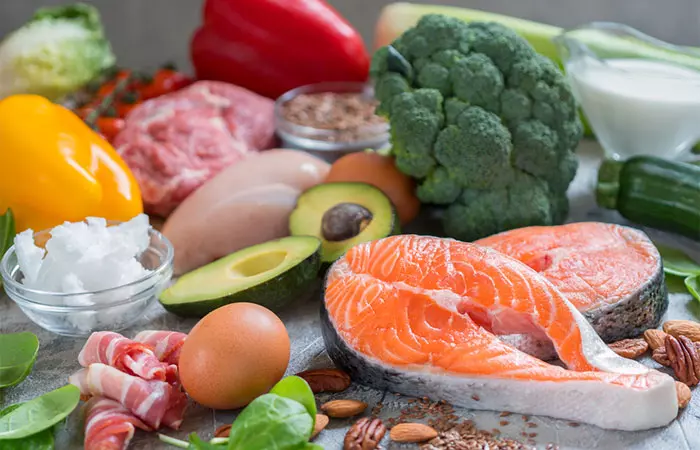
Proteins
- Chicken
- Turkey
- Beef
- Pork
- Fish
- Salmon
- Trout
- Shrimp
- Mackerel
- Eggs
Vegetables
- Spinach
- Kale
- Broccoli
- Cauliflower
- Zucchini
- Bell peppers
Healthy Fats
- Avocado
- Olive oil
- Coconut oil
- Almonds
- Walnuts
- Chia and flax seeds
- Dairy
- Greek yogurt
- Cheese
Berries (In Moderation)
- Strawberries
- Blueberries
- Raspberries
Beverages
- Water
- Green tea
- Tea, coffee (without added sugar)
- Sparkling water
Foods To Avoid On A Low-Carb Diet
Sugar
- Candies
- Sugary beverages
- Cakes
- Cookies
Starchy Vegetables
- Potatoes
- Corn
- Peas
- Butternut squash
Grains
- Wheat
- Rice
- Oats
- Barley
Processed Foods
- Chips
- Sugary cereals
- Fast food burgers
- Frozen pizzas
Before you start a low-carb diet, it’s important to consult a nutritionist and a doctor to determine what should be your ideal carb intake ratio. Depending on your health goals and preferences, they can help you set a meal plan. The next section has a sample 3-day low-carb meal plan to help you get started.
Sample Low-Carb Diet Plan For Beginners
Day 1
Breakfast
- 2 scrambled eggs with 1 cup of spinach and ½ cup of mushrooms
- 1 small avocado
Lunch
- 6 oz of sliced grilled chicken breast with 2 cups of mixed greens, ½ cup of cherry tomatoes, and 1 tablespoon of olive oil dressing.
- 1 serving of mixed nuts (almonds, walnuts, and pecans)
Snack
- 1 cup of Greek yogurt with ½ cup of blueberries
Dinner
- 6 oz of baked salmon with 1 cup of steamed/grilled asparagus
- 1 cup of cauliflower rice
Day 2
Breakfast
- 2-egg omelet with ½ cup of bell peppers and ¼ cup of feta cheese
- 1 serving of strawberries
Lunch
- 4 oz of turkey and ½ avocado, wrapped in lettuce leaves
- 1 serving of cherry tomatoes
Snack
- 4 celery sticks with 2 tablespoons of peanut butter
Dinner
- 6 oz of grilled shrimp with 1 cup of zucchini noodles
- 1 serving of steamed broccoli
Day 3
Breakfast
- A glass of spinach, almond milk, and protein powder smoothie
- 1 small apple
Lunch
- 5 oz of canned tuna tossed with 2 cups of mixed greens and 2 tablespoons of vinaigrette dressing
- 1 serving of mixed nuts
Snack
- 1 cup of cottage cheese with ½ cup of pineapple chunks
Dinner
- 6 oz of baked chicken thighs with 1 cup of Brussels sprouts
- 1 serving of cauliflower mash
Note: This is a sample diet plan. You can modify the ingredients, quantities, and portion sizes as per your taste, weight loss goals, and any other dietary requirements. If you are a beginner, it is advised to seek the opinion of a nutritionist or dietitian for a balanced plan. No matter the starting point, it is always recommended to consult a healthcare professional before starting any new diet to avoid any negative effects.
 Did You Know?
Did You Know?Following this diet along with a proper meal plan can offer several health benefits along with visible weight loss. The section below explains how to plan a low-carb diet for weight loss.
How To Do A Low-Carb Diet For Weight Loss

- Understand Low-Carb: A low-carb diet involves reducing your daily carbohydrate intake to around 20-100 grams, or even less. This shift aims to push your body into ketosis, a state where it predominantly burns fat for energy.
- Choose Your Carbs Wisely: Prioritize complex carbs from sources like leafy greens, non-starchy veggies, and berries. Cut back on simple carbs like sugar, bread, pasta, and processed foods.
- Focus On Your Protein Intake: Make lean protein a key part of your diet with options like poultry, fish, lean meats, tofu, and eggs. Protein helps preserve muscle mass as you shed pounds.
- Go For Healthy Fats: Don’t shy away from fats; opt for healthy ones such as avocados, nuts, seeds, and olive oil. These fats will help keep you feeling full and satisfied.
- Be Mindful Of The Portions: Even in a low-carb approach, portion control is vital to avoid overeating.
- Ensure Proper Hydration: Drinking enough water throughout the day supports your metabolism and overall health.
- Keep Your Meals Balanced: Plan well-rounded meals by balancing protein, healthy fats, and low-carb vegetables. This ensures you get essential nutrients during your weight loss process.
- Track Your Progress: Keep tabs on your carb intake and weight loss progress through a food diary or tracking app.
- Seek Professional Advice: Always consult with a healthcare expert or dietitian before embarking on any diet, especially if you have health concerns and sensitivities.
- Maintain An Exercise Routine: Incorporate regular physical activity into your daily life to complement your low-carb diet for effective weight loss and overall well-being.
Notwithstanding the advantages, like any other diet, this too comes with a few side effects. The section below explains these in detail. Check it out to know more.
Side Effects Of A Low-Carb Diet

- Keto Flu: At first, you might feel a bit off, akin to having the flu, accompanied by headaches and tiredness. This is known as the “keto flu”, and it usually resolves in a few days or may even take a couple of weeks, depending on how your body habituates to the diet (13).
- Constipation: Low fiber intake is associated with a high risk of constipation (14). You might experience infrequent bowel movements after starting the diet because you are eating fewer foods with fiber. Hence, try to include green vegetables to maintain proper bowel movement.
- Keto Breath: Sometimes, a low-carb diet can lead to “keto breath,” a case of bad breath that is not ideal. This is due to the presence of breath acetone, which is a significant indicator of ketosis in the body (15). Hence, following good oral hygiene and drinking plenty of water is suggested.
- Nutritional Deficiencies: When following this diet, be aware that you might miss out on some important vitamins and minerals. Plan your low-carb diet carefully to include a variety of foods, or consult a doctor about supplements.
Infographic: 5 Benefits Of A Low-Carb Diet
A low-carb diet is a very popular approach in the diet industry, and is opted for by many for its visible weight loss results. It focuses on protein and healthy fats consumption while limiting carbohydrate intake. This diet offers an array of benefits which are listed in the following infographic. Check it out to know more!

Illustration: StyleCraze Design Team
Low-carb diets are extremely popular for their purported health benefits, especially weight loss and blood sugar control. These diets majorly focus on restricting carbohydrate-rich foods and allow the consumption of foods rich in protein and healthy fats, which are used by the body to generate energy. This results in ketosis and triggers visible weight loss, along with many other benefits, like improved heart health and appetite control. There are also a wide variety of foods you can include in your low-carb diet. However, like other dietary approaches, the low-carb diet also comes with a few side effects. Therefore, it is always recommended to consult your healthcare professional for proper guidance and smooth progress of the diet to get your desired results and minimize the side effects.
Frequently Asked Questions
Is a low-carb diet sustainable in the long term?
No, a low-carb diet is not sustainable for the long term, as it may trigger nutritional deficiencies. However, if you want to continue it for a while, it is highly recommended to consult your healthcare professional and consider nutritional supplements, if necessary.
Is a low-carb diet suitable for everyone?
No, a low-carb diet is not suitable for everyone. Individuals with nutritional deficiencies, kidney problems, and eating disorders should not try a low-carb diet as it may aggravate their conditions. Furthermore, this diet is also not suitable for pregnant and breastfeeding women.
Can I still get enough fiber on a low-carb diet?
Yes, you can maintain adequate fiber intake on a low-carb diet. Include fiber-rich foods like non-starchy vegetables, nuts, seeds, and berries to meet your fiber needs
How much weight can I lose on a low-carb diet in two weeks?
Weight loss on a low-carb diet can vary significantly among individuals. While some may experience substantial weight loss in two weeks, others may see more modest results. The focus should be on sustainable and healthy weight loss rather than rapid, short-term changes.
Key Takeaways
- Low-carb diets majorly focus on including protein and healthy fats and limiting carbs consumption.
- There are many low-carb diets like the keto diet and paleo diet, and each has its own set of guidelines for carb restriction.
- Along with weight loss, low-carb diets also offer benefits like blood sugar control and reduced triglyceride levels.
Illustration: Low-Carb Diet: Types Benefits And Meal Plan
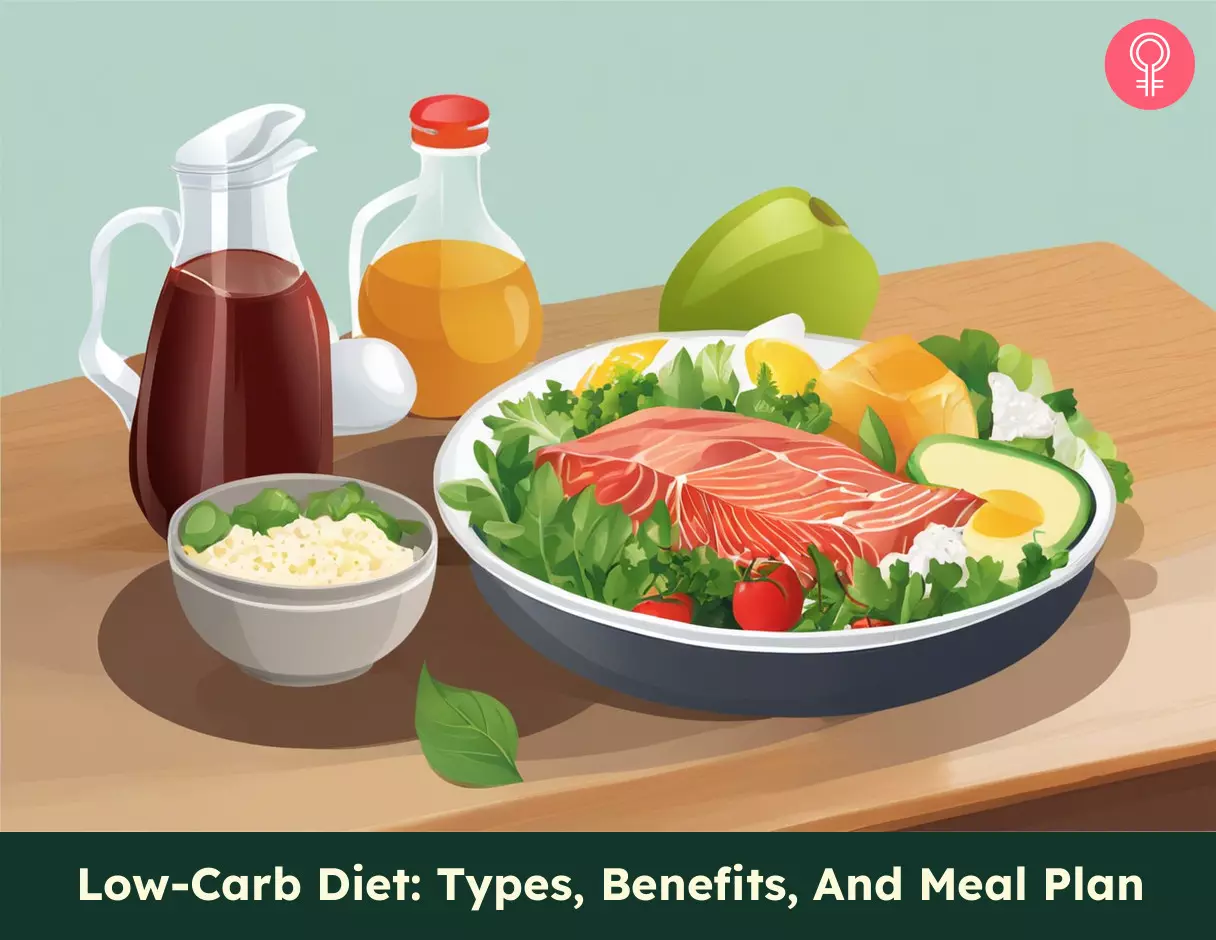
Image: Stable Diffusion/StyleCraze Design Team
Many people are often confused about which diet to choose for their weight loss regime – low fat or low carb. Click on the video below to hear it from an expert and make an informed choice.
References
Articles on StyleCraze are backed by verified information from peer-reviewed and academic research papers, reputed organizations, research institutions, and medical associations to ensure accuracy and relevance. Read our editorial policy to learn more.
- Effects of low-carbohydrate- compared with low-fat-diet interventions on metabolic control in people with type 2 diabetes: a systematic review including GRADE assessments
https://www.sciencedirect.com/science/article/pii/S0002916522029264 - Low-carbohydrate diet
https://www.ncbi.nlm.nih.gov/books/NBK537084/ - Beyond weight loss: A review of the therapeutic uses of very-low-carbohydrate (ketogenic) diets
https://www.nature.com/articles/ejcn2013116 - The Mediterranean diet and cardiovascular health
https://www.ahajournals.org/doi/10.1161/CIRCRESAHA.118.313348 - Multi-dimensional roles of ketone bodies in fuel metabolism, signaling, and therapeutics
https://www.ncbi.nlm.nih.gov/pmc/articles/PMC5313038/ - The use of low-carbohydrate diet in type 2 diabetes – benefits and risks
https://pubmed.ncbi.nlm.nih.gov/24959782/ - Low-carb and ketogenic diets in type 1 and type 2 diabetes
https://www.ncbi.nlm.nih.gov/pmc/articles/PMC6566854/ - A reduced ratio of dietary carbohydrate to protein improves body composition and blood lipid profiles during weight loss in adult women.
https://pubmed.ncbi.nlm.nih.gov/12566476/ - Effects on coronary heart disease of increasing polyunsaturated fat in place of saturated fat: A systematic review and meta-analysis of randomized controlled trials
https://www.ncbi.nlm.nih.gov/pmc/articles/PMC2843598/ - Do ketogenic diets really suppress appetite? A systematic review and meta-analysis
https://pubmed.ncbi.nlm.nih.gov/25402637/ - Comparing very low-carbohydrate vs DASH diets for overweight or obese adults with hypertension and prediabetes or type 2 diabetes: A randomized trial
https://www.ncbi.nlm.nih.gov/pmc/articles/PMC10202504/ - Substantial and sustained improvements in blood pressure, weight and lipid profiles from a carbohydrate restricted diet: An observational study of insulin resistant patients in primary care
https://www.ncbi.nlm.nih.gov/pmc/articles/PMC6695889/ - Advantages and disadvantages of the ketogenic diet: A review article
https://www.ncbi.nlm.nih.gov/pmc/articles/PMC7480775/ - Lower dietary fibre intake, but not total water consumption, is associated with constipation: A population-based analysis
https://pubmed.ncbi.nlm.nih.gov/31087475/ - Measuring breath acetone for monitoring fat loss: Review
https://www.ncbi.nlm.nih.gov/pmc/articles/PMC4737348/
Read full bio of Eleana Kaidanian
Read full bio of Ravi Teja Tadimalla
Read full bio of Sindhu Koganti

















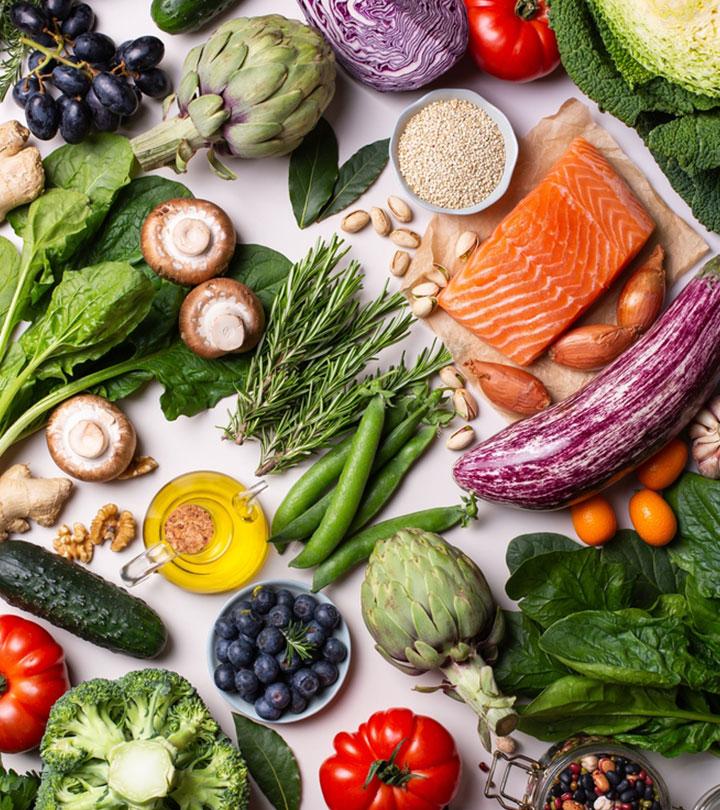

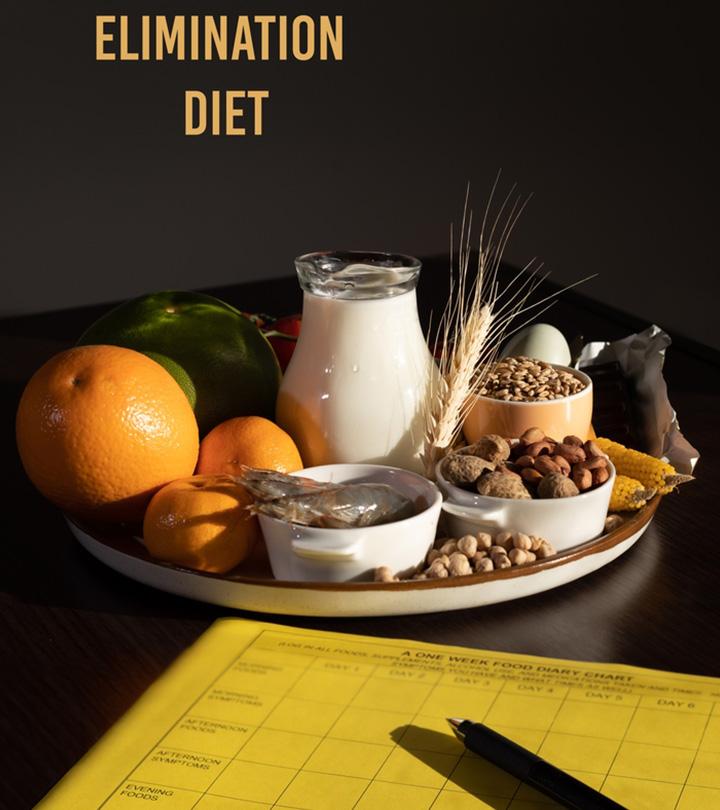



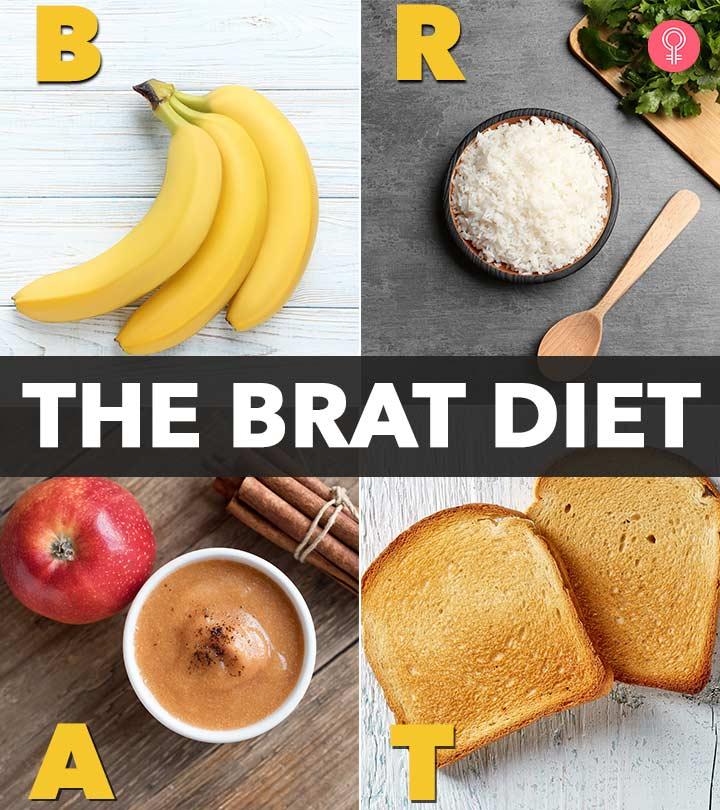


Community Experiences
Join the conversation and become a part of our empowering community! Share your stories, experiences, and insights to connect with other beauty, lifestyle, and health enthusiasts.